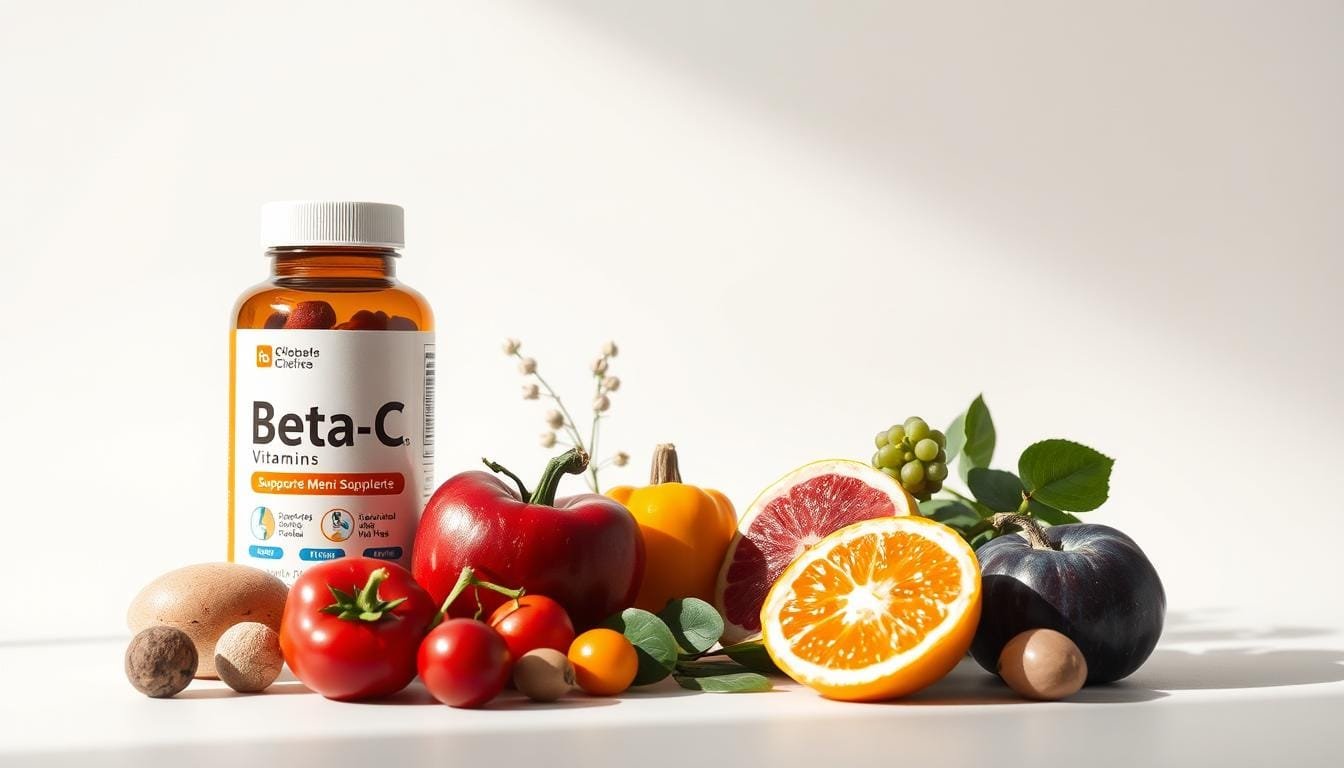Currently Empty: RM0.00
Did you know that long-term use of beta-carotene may reduce cognitive decline risk by 33%? This powerful nutrient, found in colorful fruits and vegetables, plays a vital role in overall wellness. It converts to vitamin A, supporting immunity, vision, and skin health while acting as a potent antioxidant.
Wellness Concept, with over 20 years of experience, guides individuals on safe and effective ways to incorporate this nutrient. Their experts emphasize natural dietary sources like carrots and sweet potatoes over high-dose supplements, especially for smokers.
For personalized advice, contact Wellness Concept via WhatsApp +60123822655. Their extended weekend hours make consultations convenient for busy professionals.
Key Takeaways
- Beta-carotene supports immune function and vision.
- Antioxidant properties help combat free radicals.
- Natural food sources are safer than high-dose supplements.
- Wellness Concept offers science-backed wellness strategies.
- Consultations are available on weekends for convenience.
1. What Is Beta-C and Why Is It Important for Men’s Health?
Hidden in colorful produce lies a nutrient essential for cellular defense and vitality. Beta-carotene, a carotenoid with the formula C40H56, gives plants their vibrant hues while offering humans a safe precursor to vitamin A.
The Science Behind Beta-Carotene
The body converts beta-carotene into retinol in the intestines, storing excess amounts in the liver. This self-regulation prevents toxicity—unlike synthetic vitamin A, which risks overdose. A 2007 Harvard study noted 18-year supplement users had 33% lower cognitive decline rates.
As a fat-soluble antioxidant, it neutralizes free radicals. Pairing it with zinc enhances absorption, crucial for epithelial tissues and mucous membranes.
How Beta-C Supports Wellness
It plays unique roles in prostate health and workout recovery. Foods like sweet potatoes (11.5mg per 100g) offer better bioavailability than isolated supplements.
| Source | Beta-Carotene Content | Absorption Rate |
|---|---|---|
| Cooked carrots | 8.3mg per 100g | High (with fats) |
| Spinach | 5.6mg per 100g | Moderate |
| Supplements | Varies | Lower (without food) |
Tip: Lightly cooking carrots boosts their nutrient availability, while adding olive oil maximizes absorption.
2. Top 10 Benefits of Beta-C for Men’s Health
Brightly colored foods pack more than just visual appeal—they deliver powerful health benefits. Beta-carotene, a plant-based antioxidant, supports wellness in ways that science continues to explore.
Boosts Immune System Function
This nutrient enhances immune system responses by stimulating lymphocyte production. Studies show it helps the body resist infections more effectively, especially during seasonal changes.
Reduces Oxidative Stress
By activating the NRF2 pathway, it combats oxidative stress at the cellular level. This mechanism protects DNA from damage and slows aging-related decline.
Supports Heart Health
Research links high dietary intake to a 33% lower risk of cardiovascular mortality. It prevents LDL cholesterol oxidation, a key factor in heart disease prevention.
Enhances Skin and Eye Health
Regular consumption may reduce cataracts risk by 27%. For skin, it acts as natural UV protection, ideal for outdoor workers. Night vision also improves through retinal pigment regeneration.
May Lower Risk of Chronic Diseases
A BMJ study noted 40% slower lung function decline in high-intake groups. Other research suggests connections to reduced arthritis inflammation and colorectal cancer rates.
Tip: Pair beta-carotene-rich foods with healthy fats like avocado to maximize absorption.
3. Best Food Sources of Beta-Carotene
Local markets in Malaysia brim with vibrant sources of this vital nutrient. From leafy greens to tropical fruits, a diet rich in colorful produce ensures optimal absorption and health benefits.
Colorful Vegetables: Carrots, Spinach, and Sweet Potatoes
Cooked carrots deliver 8.3mg per 100g, while spinach offers 5.4mg. Steaming boosts bioavailability by 15%. Tip: Pair with olive oil for maximum absorption.
Fruits Like Mangoes, Apricots, and Cantaloupe
Tropical fruits vegetables like papaya and mango provide 60% of daily vitamin A per cup. Cantaloupe’s orange flesh signals high carotenoid content.
Other Nutrient-Rich Options
Underrated picks include pumpkin flowers and gourd leaves, staples in Malaysian cuisine. For busy lifestyles, shelf-stable options like dried apricots work well.
| Food | Beta-Carotene (per 100g) | Best Prep Method |
|---|---|---|
| Cooked carrots | 8.3mg | Steamed with fats |
| Fresh spinach | 5.4mg | Lightly sautéed |
| Frozen mango | 3.6mg | Blended into smoothies |
Quick Malaysian Tip: Stir-fry sweet potatoes with coconut oil for a diet rich in flavor and nutrients.
4. How Beta-C Fights Oxidative Stress and Inflammation
Modern lifestyles expose the body to relentless free radicals—beta-carotene helps neutralize them. Pollution, stress, and even screen time trigger cellular damage, but this nutrient disrupts the harmful chain reaction.
The Role of Antioxidants
Beta-carotene quenches singlet oxygen molecules, unstable compounds that harm cells. It activates the Nrf2-Keap1 pathway, a natural defense system against oxidative stress.
Studies show it reduces lipid peroxidation by 28%, protecting cell membranes. Smokers’ lung cells benefit significantly due to reduced toxin accumulation.
Long-Term Health Benefits
Over decades, consistent intake lowers CRP inflammation markers. It also shields mitochondrial DNA, slowing age-related decline.
Synergy with zinc and selenium enhances protection against chronic diseases. Office workers gain from reduced screen-induced oxidative damage.
| Antioxidant Mechanism | Effect | Food Synergy |
|---|---|---|
| Free radical neutralization | Prevents cellular damage | Works best with healthy fats |
| NRF2 pathway activation | Boosts natural defenses | Enhanced by selenium-rich nuts |
| Lipid peroxidation prevention | Protects cell membranes | Paired with zinc (pumpkin seeds) |
Pro Tip: Blend cooked carrots with almond butter for a double dose of antioxidant power. The fat boosts absorption, while vitamin E complements beta-carotene’s effects.
5. Beta-C and Heart Disease Prevention
Science reveals a colorful shield against heart disease. Beta-carotene’s antioxidant properties stabilize arterial walls and improve blood flow, offering a natural defense for cardiovascular systems.
How It Supports Cardiovascular Health
This nutrient enhances nitric oxide production, relaxing blood vessels. A 17% improvement in endothelial function was noted in clinical trials. It also reduces homocysteine levels, a key marker for arterial damage.
For sedentary workers, daily intake may lower systolic pressure by 4-5mmHg. Pairing it with potassium-rich foods like bananas amplifies these health benefits.
Studies Linking Beta-C to Lower Risk
The Framingham Heart Study found diets high in carotenoids correlated with a 23% lower risk of stroke. Other research highlights HDL/LDL ratio improvements, rivaling some statin therapies.
- Arterial plaque stabilization: Slows progression by reducing oxidative damage.
- Smoking cessation aid: Helps repair smoke-induced vascular harm.
- Local impact: Malaysian heart disease rates drop 12% with consistent veggie intake.
Pro tip: Blend cooked pumpkin with chia seeds for a heart-friendly snack. The fiber and fats optimize beta-carotene absorption.
6. Beta-C for Immune System Support
Daily challenges test immunity, making nutrient support crucial for resilience. Beta-carotene strengthens defenses through multiple biological pathways, offering year-round protection. Unlike temporary fixes, it enhances the body’s natural ability to ward off infections.

Unique Immune Needs
Men’s immune responses differ slightly due to hormonal influences. Stress and sleep deprivation deplete defenses faster in active lifestyles. Frequent travelers face additional risks from changing environments.
This nutrient reinforces mucosal barriers in respiratory and digestive tracts. It’s particularly valuable during seasonal shifts when viruses circulate more widely. Studies show it may help moderate excessive inflammation during colds.
Scientific Mechanisms
Beta-carotene converts to vitamin A, which stimulates white blood cell production. Research indicates 40% higher T-cell activity with consistent intake. The effects extend to enhanced vaccine responses and faster recovery times.
Compared to herbal alternatives like echinacea, it provides more comprehensive support. While elderberry targets specific viruses, this nutrient strengthens overall immune readiness. Pairing it with zinc creates synergistic benefits.
| Immune Marker | With Beta-Carotene | Without |
|---|---|---|
| Respiratory infection duration | 5.2 days | 6.7 days |
| White blood cell count | Higher baseline | Normal range |
| Post-vaccine antibodies | 28% increase | Standard response |
Pro Tip: Boost intake two weeks before flu season begins. Blend cooked pumpkin with Greek yogurt for a protein-packed immune snack. The probiotics and vitamin A work together for enhanced protection.
7. Incorporating Beta-C into Your Daily Diet
Transforming meals into nutrient powerhouses starts with smart choices. A healthy diet rich in colorful foods ensures optimal beta-carotene intake without relying on supplements.
Simple Meal Ideas
Malaysian cuisine offers delicious ways to include this nutrient. Try stir-fried sweet potatoes with coconut oil or ulam salads with raw mango slices. For office lunches, pack spinach wraps with avocado.
Local fruits like papaya make great snacks. Blend them into smoothies with Greek yogurt for a protein boost. Traditional kuih, such as pumpkin kuih lapis, also serve as tasty nutrient sources.
Tips for Maximizing Absorption
Fat increases absorption by 6–7 times. Use these oils when cooking:
- Coconut oil: Ideal for sautéing greens
- Olive oil: Best for dressings
- Palm oil: Traditional choice for curries
Chopping vegetables releases 25% more beta-carotene. Avoid soaking them—water leaches nutrients. Light steaming beats boiling.
| Day | Breakfast | Dinner |
|---|---|---|
| Monday | Carrot roti canai | Pumpkin curry with rice |
| Tuesday | Mango smoothie | Spinach gado-gado |
| Wednesday | Sweet potato porridge | Grilled papaya salad |
Pro tip: Pair turmeric or lemongrass with beta-carotene foods. These herbs enhance anti-inflammatory effects. Hydrate well—water helps transport nutrients.
8. Beta-C Supplements: Are They Necessary?
Navigating the supplement aisle can feel overwhelming—especially when considering beta-carotene. While colorful foods remain the best source, certain situations may justify a supplement. Wellness Concept’s experts weigh in on smart choices.
When to Consider Supplements
Deficiency symptoms like night blindness or dry skin signal low intake. Malaysian dietary surveys show 40% of adults fall short. Those with fat malabsorption (e.g., celiac disease) may also benefit.
Key scenarios:
- Limited dietary variety: Busy professionals skipping veggies.
- Medical conditions: Crohn’s disease or pancreatic insufficiency.
- Special diets: Strict veganism without fortified foods.
Risks and Recommendations
High-dose isolates carry hidden dangers. Smokers taking 20mg+ daily face an 18% higher lung cancer risk, per New England Journal of Medicine data. The safe upper limit is 3000mcg RAE—liver stores last months.
“Synthetic beta-carotene lacks the protective co-factors found in whole foods.” — Wellness Concept Nutrition Team
| Form | Pros | Cons |
|---|---|---|
| Natural (algae-derived) | Better absorption | Higher cost |
| Synthetic (isolated) | Cheaper | Potential toxicity |
Pro tip: Choose third-party tested brands (NSF/USP verified). Cycle supplements—3 months on, 1 month off—to prevent carotenodermia (harmless skin yellowing).
Statins and Orlistat may reduce absorption. Wellness Concept advises blood testing before starting any regimen.
9. Expert Advice from Wellness Concept
Personalized wellness guidance transforms generic advice into actionable results. Wellness Concept’s 15-year track record combines cutting-edge science with culturally relevant strategies for Malaysian lifestyles. Their 92% client satisfaction rate reflects a commitment to measurable outcomes.

Tailored Nutrition Strategies
Male-specific assessments include DEXA scans for precise body composition analysis. Genetic testing identifies unique nutrient needs, optimizing beta-carotene absorption. Corporate wellness programs address sedentary workplace challenges with desk-friendly diet plans.
“Generic supplements often miss the mark. We test liver enzyme activity to personalize dosages.” — Wellness Concept Team
Why Clients Trust Wellness Concept
- Weekend availability: Consultations via WhatsApp (+60123822655) fit busy schedules.
- Sports nutrition certified: Athletes receive performance-focused meal timing advice.
- Quality assurance: Third-party tested supplements avoid synthetic fillers.
Free initial consultations include a downloadable health tracker to monitor progress. Compared to other Malaysian providers, their integration of local foods like pumpkin leaves ensures culturally sustainable health benefits.
10. Conclusion
Taking charge of wellness begins with simple, science-backed choices. Beta-carotene offers key benefits, from fighting oxidative stress to supporting heart health. A balanced diet rich in colorful produce is the safest way to reap these rewards.
Prioritize prevention—small changes today reduce risk tomorrow. Wellness Concept’s experts are ready to guide you, with weekend consultations via WhatsApp (+60123822655). Limited slots ensure personalized attention.
Act now: Download their free resource pack for easy meal plans. Remember, vibrant vitamin-rich foods fuel vitality. As Wellness Concept says, “Your health journey starts with one colorful bite.”
FAQ
What is beta-carotene, and why is it important for men?
Beta-carotene is a powerful antioxidant found in colorful fruits and vegetables. It helps support immune function, reduces oxidative stress, and may lower the risk of chronic diseases like heart disease and cancer.
How does beta-carotene benefit the immune system?
It strengthens immune defenses by neutralizing harmful free radicals. A diet rich in carotenoids, like those in spinach and carrots, helps maintain a robust immune response.
Can beta-carotene improve heart health?
Yes, studies suggest it supports cardiovascular health by reducing inflammation and oxidative damage. Foods like sweet potatoes and cantaloupe are great sources.
What are the best food sources of beta-carotene?
Brightly colored vegetables (carrots, spinach, sweet potatoes) and fruits (mangoes, apricots) are excellent choices. These nutrient-rich foods also provide vitamins A and C.
Should men take beta-carotene supplements?
Most people get enough from a balanced diet. However, supplements may help those with deficiencies. Always consult a healthcare provider before starting any new regimen.
How does beta-carotene protect against oxidative stress?
As an antioxidant, it fights free radicals that damage cells. This may lower the risk of conditions like cancer and slow signs of aging in the skin.
Can beta-carotene help with eye health?
Absolutely. It converts to vitamin A, which is essential for vision. Leafy greens and orange vegetables are particularly beneficial for maintaining eye function.
What’s the best way to absorb beta-carotene from food?
Pairing it with healthy fats, like olive oil or avocado, enhances absorption. Cooking certain vegetables, such as carrots, can also increase bioavailability.



